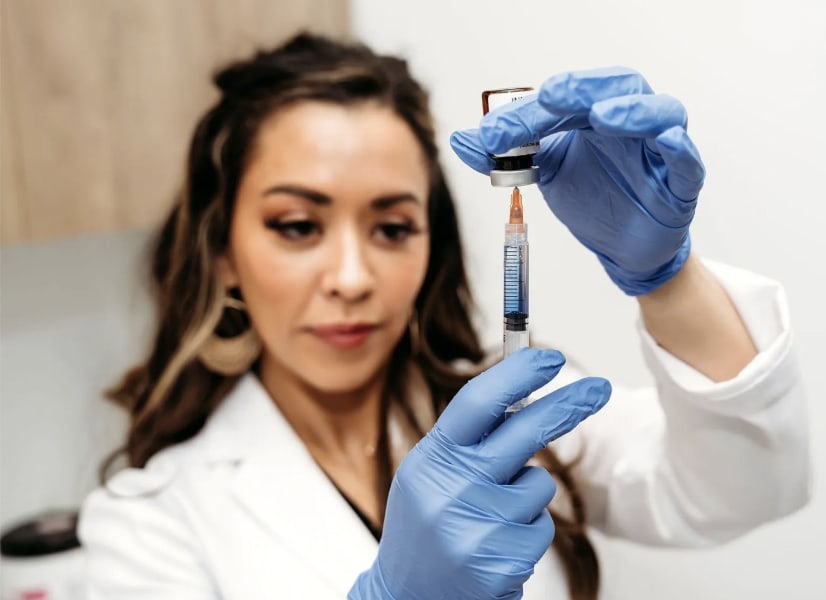In the quest for optimal health and peak performance, body composition plays a critical role. Amino acids, the basic building blocks of proteins and peptides, are essential in metabolic processes and the synthesis of peptide hormones. Functional medicine focuses on addressing the root causes of health challenges, and one of its cutting-edge tools is peptide therapy. Among these, GLP-1 peptides stand out as a revolutionary option for transforming body composition and supporting sustainable wellness.
Understanding GLP-1 Peptides and Blood Sugar
GLP-1 (glucagon-like peptide-1) peptides are naturally occurring hormones that regulate appetite, glucose metabolism, and insulin sensitivity. As GLP-1 receptor agonists, these peptides can help individuals achieve improved body composition by targeting visceral fat, enhancing metabolic efficiency, and promoting lean muscle mass.
The peptides work by:
- Curbing Cravings: GLP-1 peptides reduce appetite by influencing hunger signals in the brain, helping to control caloric intake without extreme dieting.
- Boosting Metabolism: They improve glucose utilization and insulin sensitivity, which aids in efficient energy usage.
- Targeting Fat: By reducing visceral fat (the dangerous fat around your organs), GLP-1 peptides help shift your body composition towards a healthier ratio of fat to muscle.
The Functional Medicine Approach to Therapeutic Peptides
Functional medicine emphasizes personalized care, and GLP-1 peptides are a prime example of tailored treatment. By integrating peptide therapy into a broader health plan, practitioners can optimize metabolic function and address the underlying factors contributing to weight gain and muscle loss. Additionally, combining GLP-1 peptides with growth hormone secretagogues can enhance muscle growth and recovery, benefiting individuals in athletic training and competition.
Here’s why GLP-1 peptides are making waves in functional medicine:
- Root Cause Resolution: Unlike fad diets or quick fixes, these peptides work at a physiological level to correct metabolic imbalances.
- Synergy with Lifestyle Changes: Combining GLP-1 therapy with movement, strength training, and nutrient-dense diets amplifies results.
- Sustainable Results: By supporting long-term metabolic health, these peptides encourage lasting changes in body composition.
Key Benefits of GLP-1 Peptides for Weight Loss
Incorporating GLP-1 peptides into a functional medicine approach can help patients lose weight and lead to numerous health benefits, including:
- Enhanced Fat Loss: GLP-1 peptides specifically target visceral fat, which is linked to conditions like insulin resistance and inflammation.
- Improved Energy Levels: With better metabolic efficiency, you’ll experience more consistent energy throughout the day.
- Better Cardiovascular Health: Reducing visceral fat and improving glucose metabolism lowers the risk of heart disease.
Treatment with GLP-1 Peptides
GLP-1 peptides are a class of therapeutic peptides that mimic the action of the naturally occurring hormone glucagon-like peptide-1 (GLP-1). These synthetic peptides have revolutionized the treatment landscape for type 2 diabetes mellitus and obesity, offering a powerful tool to lower blood sugar levels and promote weight loss.
By binding to GLP-1 receptors in the body, these peptides trigger a cascade of beneficial effects. They help regulate blood glucose levels by enhancing insulin secretion and inhibiting glucagon release, which collectively contribute to better glycemic control. Additionally, GLP-1 peptides slow gastric emptying and reduce appetite, making it easier to manage caloric intake and achieve sustainable weight loss.
Several types of GLP-1 peptides are available, including exenatide, liraglutide, dulaglutide, and semaglutide. These medications are typically administered via injection and are often used in combination with other treatments, such as metformin, to optimize blood sugar control.
Beyond their role in diabetes management, GLP-1 peptides are also effective in addressing obesity. By curbing hunger and enhancing feelings of fullness, they support significant reductions in body weight, making them a valuable component of a comprehensive weight management strategy.
In summary, GLP-1 peptides are a vital treatment option for individuals with type 2 diabetes and obesity. When combined with other medications and lifestyle modifications, they offer a robust approach to achieving optimal blood sugar control and effective weight management.
Monitoring GLP-1 Peptide Therapy
Monitoring GLP-1 peptide therapy is crucial to ensure the medication is working effectively and safely. Here are some key aspects to keep an eye on:
- Blood Sugar Levels: Regular monitoring of blood sugar levels is essential to confirm that the therapy is effectively lowering blood glucose levels. This helps in adjusting dosages and ensuring optimal glycemic treatment.
- Weight and Muscle Mass: Keeping track of body weight is important to gauge the effectiveness of the therapy in promoting weight loss. Using an Inbody machine to also assess any potential loss of muscle mass is key to ensure the results are long-lasting.
- Appetite and Satiety: Observing changes in appetite and feelings of fullness can provide insights into how well the medication is working to reduce hunger and support weight management.
- Gastrointestinal Side Effects: GLP-1 peptides can cause gastrointestinal side effects such as nausea, vomiting, and diarrhea. Monitoring these symptoms ensures they are manageable and not severe.
- Kidney Function: Since GLP-1 peptides can impact kidney function, regular monitoring is necessary to prevent potential kidney injury and ensure the medication is not causing adverse effects.
- Thyroid Function: Monitoring thyroid function is also important, as GLP-1 peptides can affect thyroid health. This helps in identifying any issues early and addressing them promptly.
Overall, diligent monitoring of GLP-1 peptide therapy is essential to ensure the treatment is both effective and safe. By keeping a close watch on these key aspects, potential side effects can be identified and managed promptly, ensuring the best possible outcomes for patients.
Is GLP-1 Therapy Right for You with Diabetes Mellitus?
GLP-1 peptides are a game-changer for individuals looking to improve their body composition, whether they’re battling stubborn weight gain, struggling with metabolic issues, or simply seeking to optimize their health. However, they’re most effective when paired with a personalized plan that considers your unique health profile and lifestyle. It is important to note that GLP-1 agonists are not recommended for patients with a personal or family history of medullary thyroid cancer, emphasizing the need for further investigations into the long-term effects of these medications on the thyroid gland.
Your Partner in Health: Yoo Direct Health
At Yoo Direct Health, we’re committed to leveraging the latest advancements in functional medicine to help you achieve your health goals. Our comprehensive approach includes longevity-focused testing, hormone optimization, and peptide therapy, including GLP-1 peptides, to ensure you’re set up for success. We follow a specific procedure, monitoring muscle loss, ensuring the highest standards of medical care.
Learn more on The Better Yoo Podcast!



